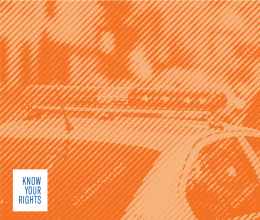
More than 65 clergy members testify to the trauma of racial profiling on their communities
More than five dozen clergy members spanning 15 New Jersey counties filed a brief at the New Jersey Supreme Court, represented by the ACLU-NJ, that urges justices to take bold action to end racial profiling.
The brief (PDF), filed on behalf of 66 New Jersey ministers, imams, rabbis, and other leaders of a range of faith traditions, draws on the collective accounts of the trauma, humiliation, and dehumanization racial profiling regularly inflicts on their Black and brown members of their communities.
This brief stands as a powerful testament to a truth that is often missing in legal cases and analysis concerning the subject, which typically centers around improper searches in criminal cases: the vast majority of racial profiling goes unnoted because it does not result in any charges, leaving its ineffectiveness and mass trauma unseen.
“While courts typically learn about allegations of racial profiling in the context of the rare police actions that yield evidence of criminal behavior, clergy people see the daily trauma of racial profiling, which unfairly casts the shadow of suspicion based solely on race without leading to any arrest,” said ACLU-NJ Director of Supreme Court Advocacy Alexander Shalom. “Clergy serve as daily witnesses to the reality that racial profiling does not simply hurt individuals – it injures entire communities.”
The case before the Court concerns an incident in which police officers pulled over three Black men based on a description of two Black men as suspects of a robbery, along with the police officer’s claim that the three men did not visibly react to a spotlight pointed in their direction. The brief asks the Court to bar police officers from conducting stops where the only, or predominant, basis is that the people stopped match the race and gender of the suspects, without any other additional identifying details.
“The clergy members we represent provide pastoral care in and to diverse communities throughout New Jersey, and they share a common experience: Each one has served members of their communities who have been stopped by police because of their race,” said ACLU-NJ Legal Director Jeanne LoCicero. “The clergy members in this suit have seen the trauma of people close to them after unjustified stops based on their race, and they have counseled people through the fear and psychological wounds that follow them from those encounters.”


